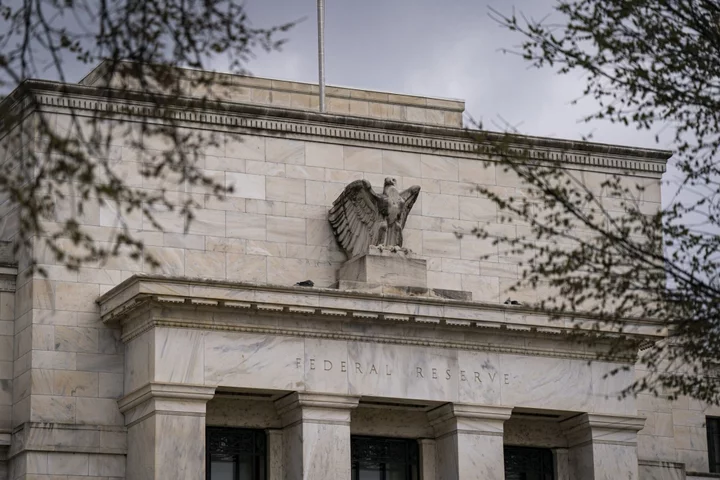US regulators are ratcheting up oversight efforts across the banking system as they lack the ability to quickly overhaul rules to blunt turmoil that’s already collapsed four mid-sized lenders.
The Federal Reserve and the Federal Deposit Insurance Corp. have been peppering lenders over the past several weeks with questions related to interest-rate risks and commercial real estate exposure, according to people familiar with the matter. Failures by Silicon Valley Bank and Signature Bank to deal with surging borrowing costs were partly blamed for their demise.
The stepped up oversight dovetails with a political standoff between the White House and Republican lawmakers over raising the US’s debt ceiling, and concern that failing to reach a deal would cause widespread calamity. There’s also a creeping realization that the government’s extraordinary move to spend billions of dollars to make uninsured depositors whole, and deploy other measures to shore up teetering lenders, haven’t eased the jitters.
“The biggest problem is confidence, and I am not sure how you build that back,” says Sandeep Dahiya, a professor at Georgetown University and financial market researcher. “Deposit volatility is higher than we thought because we never saw what fast interest-rate increases can do in a world where information on banks is so much easier to act upon by the depositors.”
Representatives for the Fed and FDIC declined to comment.
Congressional Oversight
Whether regulators did enough to shore up the system, or sufficiently prevented stresses ahead of time, will take center stage at four congressional hearings scheduled for this week.
The Fed’s vice chair for supervision, Michael Barr, said in remarks prepared for a Tuesday appearance before the House Financial Services Committee that he plans to “improve the speed, force, and agility of supervision.”
He’s previously said that the Fed is exploring ways to speed up remedial action by banks, including by potentially limiting dividends and buybacks if supervisors found their capital to be deficient.
Still, inside the halls of regulatory power in Washington, there’s an acceptance that agencies will need months, if not years, to toughen standards through new rules. A bitterly divided Congress also makes any swift action seem a long shot at best, training Washington regulators’ sights further on oversight fixes for the near term.
In addition to digging into interest-rate risks, the FDIC has bolstered scrutiny of the extent to which lenders’ depositors are uninsured, said one of the people, who asked not to be identified discussing the contours of the effort that haven’t been made public. The agency has asked its supervisors to focus on the issue, said the person.
Fed Supervisors
Meanwhile, Fed supervisors are also stepping up scrutiny of firms that have a combination of high unrealized securities losses in combination with another issue, like a high level of uninsured depositors, said another one of the people. Supervisors are also looking closely at the potential for future losses in banks’ commercial real estate portfolios, given shifting patterns of office work.
Deposit outflows and sharp declines in stock prices can also be considered risk factors. Regulators have seen some firms successfully mitigating the situation, the person added.
The issues are not seen as system-wide problems, but are being probed on a bank-by-bank basis.
The more intense supervisory reviews also may impact banks’ earnings in the medium term. For lenders with troubled CRE exposures, there will be an emphasis on raising loan-loss provisions, and for banks with runnable deposits and losses on their securities portfolios there will be an emphasis on maintaining plentiful cash, said the person.
Self Criticism
Wall Street remains transfixed on which small banks could buckle next and gaming out high-drama government auctions for their corpses. A closely watched index for shares in mid-sized lenders has plunged almost 40% since before the government took over Silicon Valley Bank, known as SVB, two months ago.
The dynamic is a deeply uncomfortable one for regulators. It’s even prompted unusually blunt self-criticism by the Fed and FDIC.
Uninsured depositors — often businesses with significantly more money parked at a lender than the $250,000 limit — were rampant at SVB and Signature Bank. Concerns that the bank’s failures could mean that businesses wouldn’t make payroll prompted the government to step in and insure all deposits, draining an estimated $15.8 billion for the US’s bedrock insurance fund.
Expanding Insurance
Efforts are already underway to replenish the fund, known as the DIF, but the episode has fueled calls for a broader move to extend insurance coverage to at least some deposit accounts that businesses rely on to operate. Earlier this month, the FDIC said that it wanted Congress to approve expanding insurance coverage for corporate payment accounts.
Although raising the cap has some support among both Republicans and Democrats, there’s no sign that any changes will be fast-tracked.
Sherrod Brown, a Democrat from Ohio who leads the Senate Banking Committee, recently told Bloomberg that there’s no consensus yet among lawmakers on the need for the change.
Interest-rate Risk
The Banking Committee will hold an oversight hearing on Thursday with witnesses including FDIC Chairman Martin Gruenberg and Barr, the Fed’s top banking regulator.
Nellie Liang, the US Treasury Department’s top domestic policy official, last week signaled that officials were studying their options for policy changes, regardless of whether lawmakers stepped in.
“Going forward, bank and regulators will review how liquidity risk and interest rate risk management and regulation may need to adjust given the effects of changes in technology and social media on deposits — their sensitivity to interest rates and their stability in stress,” she said during a May 11 speech at an industry event in Chicago.
--With assistance from Saleha Mohsin, Paige Smith and Steven T. Dennis.
(Updates with comment from Fed official in seventh paragraph.)

